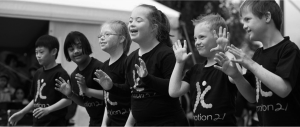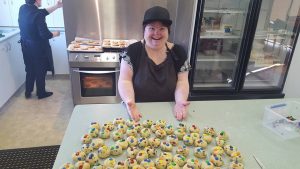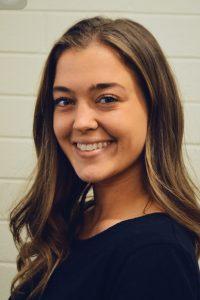For people living with a disability, employment and social participation are complex problems without a simple solution.
This is certainly the case in Australia. Those with a disability aged between 15 and 64 years have both lower participation (53%), and higher unemployment rates (9.4%), than people without disability (83% and 4.9%), according to The Australian Network on Disability.
Fortunately, all over Australia, organisations like e.motion 21 and Chancez Cafe are finding creative ways to reduce barriers that restrict participation.
E.motion21 is a not-for-profit organisation that provides dance and fitness programs for children and young adults living with Down syndrome.
Unable to find an appropriate dance class to meet her daughter’s learning needs, Cate Sayers started e.motion21 so her daughter could have the same opportunities as her sisters. The first class was held in the Melbourne suburb of Kew in 2009 and now the e.motion 21 movement regularly showcases the talents of people with Down syndrome.
“Going to school, being offered meaningful and sustainable employment, being paid fairly, living independently, going out with friends, being a valued member of the community, feeling like you belong. With awareness and understanding, open hearts and minds, we can create opportunities for all,” Sayers tells upstart.
“Historically, we haven’t given people with a disability the opportunity to reach their potential. Society carries a lot of misunderstanding and lack of awareness about the possibilities based on their limited experience,” she says.
Sayers aims to enhance the lives of her students, change perceptions and break down society’s pre-conceived ideas. She believes this gives an opportunity to “shift perhaps some outdated ideas of what people with disabilities are capable of.”
“Often it’s not the disability that is the barrier to people reaching their potential; it is the reaction to the disability from society,” she says.

In 2015, almost 1 in 12 Australians with a disability reported that they experienced discrimination or unfair treatment because of their disability.
Perceptions about their employability is one way that people with a disability experience discrimination, with Dr George Taleporos calling for better education and training to improve job readiness and opportunities in the workforce.
In an ABC article, Taleporos says that government must implement a range of reforms that assist people with a disability to find meaningful, long term employment.
Chancez Cafe is one organisation attempting to tackle employability perceptions.
Manager Leigh Morante tells upstart that the cafe is a hub that offers “life-changing opportunities” for the employees.
The cafe came about when participants of Araluen, a community that provides a large range of supports for people with intellectual disabilities, were undertaking training in barista skills and food processing.
The only problem, Morante explains, is that there was nowhere for them to gain actual practical experience with real customers and facilities.
A partnership between Araluen, the City of Whittlesea and Brotherhood of St Laurence led to the establishment of the first Chancez Café, situated within the Epping Community Services Hub.
The café only hires people with disability in an attempt to give participants the skills, support and courage to find work of their own, and to reduce the supports required.
“The confidence in staff has increased massively. We have two almost completely independent baristas; participants that are now beginning to assist with training, phone ordering, and basic accounting; and participants who started out barely loud enough to hear that are now extremely confident with customers.
“We carefully use pressure situations and busy times to give our staff an example of work in a real café, which each and every one of our staff really step up to and conquer with great enthusiasm,” Morante says.
When it comes to advice on what people can do to be more inclusive, Morante believes that the best way would be to recognise and work with the skills an individual might have, rather than concentrating on a disability.
“Often, it’s only a small amount of change or support that will bring about the very best. It would be great if more businesses could provide support for participants to have valued and inclusive roles within the workforce and community,” she says.
According to the Australian Bureau of Statistics, almost 4.3 million Australians have reported that they live with a disability.
3.7 million of those Australians had a specific limitation or restriction with core activities, communication, mobility or self-care.

At La Trobe University, Equity and Diversity work to support students with specialised and specific needs, including students with disability, refugee and asylum seeker backgrounds, from regional and remote areas, and from low socio-economic backgrounds.
Equity and Diversity Manager, Shannon Kerrigan says that being successful in gaining employment after completing a degree is important to the vast majority of the students.
“La Trobe has a dedicated group of staff across all campuses who support students with a disability to have equitable access to education,” Kerrigan tells upstart.
The Career Ready program, which is available to students up to 12 months after completing their study, can help people connect with future employers, find jobs and internships and prepare job applications for interviews. These include specific disability-focused activities.
If students are registered with Equity & Diversity they will regularly get messages with information on traineeships and job opportunities.
Kerrigan says when it comes to equal opportunity for students, the La Trobe team try to provide a range of programs to support individuals in their study to enable an equal outcome once they’re finished.
“Lack of exposure and fear can lead people to feel uncomfortable and uncertain when meeting somebody with a disability,
“Until we see full and fair representation across communities, workplaces and the media, we will not be able to break down preconceived ideas about the value in the diversity of our community members, including those with a disability,” Kerrigan explains.
“In many cases the incredible talent and capacity of people with a disability gets lost in the focus on the small area in which they might need assistance. Our strengths as a community are in our diversity not in our similarity, so embrace the difference.”


 Jiordan Tolli is a third year Bachelor of Journalism student at La Trobe University. You can follow her on Twitter at:
Jiordan Tolli is a third year Bachelor of Journalism student at La Trobe University. You can follow her on Twitter at: 




